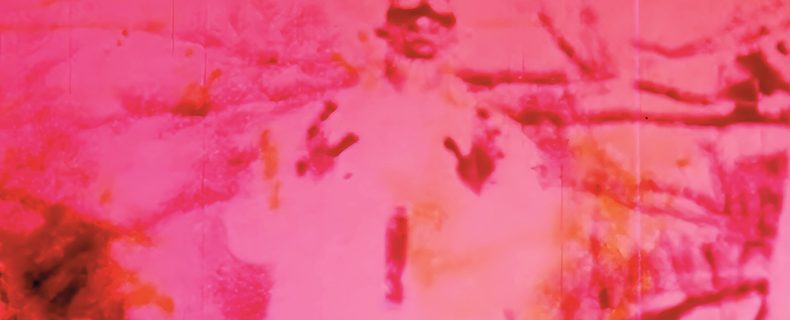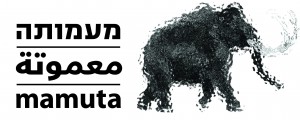בצעדים סומים

בצעדים סומים
אוצרת: ג׳ודית לנגלרט
אמנים: דב אור נר, אברהם אילת, גדעון גכטמן, יורם ואלינה גרוס, יוכבד וינפלד, יהושע נוישטיין, ג׳ורג׳ט בלייה וג׳ררד מרקס, חיים מאור, דוד פרלוב
19.7-26.9.24
שעות פתיחה: ג׳-ה׳ 13:00-18:00, ו׳ 10:00-14:00
״שכוב היה אפרקדן ועיניו העצומות כלפי מרום.. הכל שקע עמו מטה, חזר ושקע במסתרים. העמיק בנבכי עבר וירד. ואט-אט צצה-עלתה בזכרונו החזות הרחוקה, הנשכחת, כי כך כבר נתקיים העולם זה פעמים אחדות וחזר ושקע תחתיו. כל פעם טבחו בני-האדם אלה את אלה, ביקעו את החלל. עדיין מהדהדים הקולות.״
לייב רוכמן, בצעדים סומים על פני האדמה (מיידיש: א"ד שפיר), תל אביב: עם עובד, 1976 [1968], עמ׳ 12
הרומן בצעדים סומים על פני האדמה (1976 [1968]) מאת לייב רוכמן, סופר יהודי יליד פולין שהתיישב בירושלים וכתב ביידיש, מספר את סיפורו של ניצול שואה יהודי המשוטט בערי אירופה החרבות לאחר המלחמה והוזה מקומות ופנים מוכרים שאליהם הוא מתגעגע. התערוכה, ששמה לקוח משם ספרו של רוכמן, מהדהדת את הגישה ההיברידית שלו לזיכרון, טראומה ומקום וכוללת סרטים קצרים, עבודות וידיאו וצילומים שנוצרו בישראל בשנות השבעים ותחילת שנות השמונים, תקופה שבה הופיעו בזירה הישראלית אמנות מיצג, אמנות גוף ווידיאו ארט. בניסויים בתוך מדיומים אלו מצאו אמנים ישראליים צעירים דרכים חדשות לבטא את הפרפורמטיביות של הזיכרון. בעבודות, שהן בו זמנית שירה, לחשים והזיות, הזיכרון הוא גם פעולה וגם מצב תודעתי; הוא בעיקר הליכה בעקבות דימויים שמתפרקים ומשנים צורה. דרך עבודות אלו מבטאים אמני התערוכה את החוויה המורכבת של קונפליקטים במקום (כאן ושם), בזמן (עכשיו ואז) ובין העצמי לאחרים – שיבושים בלתי נמנעים בתודעה.
התערוכה מציגה צילומים (חיים מאור, יהושע נוישטיין, ג'ורג'ט בלייה וג'ררד מרקס, דב אור נר ויוכבד וינפלד) ודימויים נעים ומחברת בין ז'אנרים שונים, כמו קולנוע ניסיוני ווידיאו ארט (אברהם אילת, גדעון גכטמן, חיים מאור), קולנוע דוקומנטרי (דוד פרלוב) וסרטי אנימציה (יורם ואלינה גרוס). וידיאו ארט, מדיום שהופיע רק אז באמנות הישראלית, הוא בשביל אמנים אלה לא כלי תיעוד פשוט ולא "המדיום הפוסטמודרני פר אקסלנס" (פרדריק ג'יימסון), אלא שפה חזותית של החלום, הזיכרון והתודעה. הם אינם מתאימים את עצמם לקודים של הזיכרון הקולקטיבי או לדרכים פוזיטיביסטיות של התבוננות בהיסטוריה ובזהות, אלא משתמשים בפרקטיקות אלטרנטיביות, אישיות ולעיתים רעועות, של התייחסות לזיכרון ולטראומה.
רבות מהעבודות בתערוכה הן תמונות או סרטונים המתעדים מיצגים, שאת רובם ביצעו האמנים עצמם. האמנים משתמשים בהם בגוף ככלי לשחזר או להחיות את מה שנדמה שהוא בלתי נראה או שנעלם. עבודות אלו הן ביטויים אוונגרדיים וניסיוניים של גילום זיכרון טראומטי בגוף, ובכך הן מקדימות בשני עשורים כמעט את הטיפול הפוסטמודרני בזיכרון השואה בזירת הווידיאו ארט הישראלית של שנות התשעים. התערוכה מדגישה את העימותים הבלתי נמנעים בין טראומות משותפות, כגון השואה ומלחמת יום הכיפורים, לסוגיות זהות ומגדר ולחוויות האישיות של האמניות האמנים.
האמנות המושגית נתפסת על פי רוב כטאוטולוגית מטבעה, מתבוננת באמנות עצמה, ואמנות הגוף תוארה לא פעם כמדיום שהוא "טבולה ראסה". בניגוד לתפיסות אלה אפשר לראות את העבודות המוצגות בתערוכה לא רק כייצוגים של אסתטיקה אוונגרדית ישראלית, אלא כמחוות פרפורמטיביות המפעילות מחדש מערכים חזותיים מהעבר ומדגימות את מנגנוני הזיכרון והטראומה.
התערוכה היא חלק מעבודת דוקטורט על זיכרון השואה בווידיאו ארט בישראל מאז שנות השבעים. העבודה, שנכתבת במסגרת שיתוף פעולה בין החוג לתיאטרון ולימודי פרפורמנס באוניברסיטה העברית בירושלים ובין החוג לאמנויות ושפות ב-Ecole des Hautes Etudes en Sciences Sociales בפריז, צרפת. החלק הראשון של המחקר בוחן את ההתנסויות הראשונות בפילם ווידיאו לצורך העיסוק בזיכרון ובטראומה של השואה.
תודות האוצרת: תודה לד"ר אן לפונט (Ecole des Hautes Etudes en Sciences Sociales) ולד"ר דיאגו רוטמן (האוניברסיטה העברית), שמנחים אותי בחוכמה ובנדיבות בעבודת הדוקטורט שלי; לרות דבל, שפתחה את דלתה באהבה, ולויויאן אוסטרובסקי על הדיאלוג המרתק והתמיכה הנדירה; לצוות מעמותה על הליווי וההפקה המדהימה.
אוצרת: ג׳ודית לנגלרט | הפקה: מרכז לאמנות ומחקר מעמותה | מנהלת אמנותית: לאה מאואס | מנהלת פרויקטים: נעמה מוקדי | מנהל טכני והקמה: איתן חביב | עיצוב גרפי: מאיה שלייפר | תרגום לערבית: אנוואר בן בדיס | עריכת לשון עברית: ענבל קידר | עריכת אנגלית: ג׳ודית אפלטון | אחראית חלל תערוכות: גיל גודינגר
התערוכה מכילה עירום וכוללת דימויים שאינם מתאימים לילדים. כניסתם באחריות ההורים
אירוע פתיחה: שישי 19.7, 12:00. אירוע פייסבוק
===
הקרנת הסרט הדוקומנטרי "מחנה משותף" (2016) בבימוי אודי ניר ושגיא בורנשטיין, תתקיים בתאריך ה-6 לאוגוסט 2024 בשעה 19:30, בקולנוע בית הנסן. שיחה עם היוצרים תתקיים לפני הקרנת הסרט. ביום ההקרנה התערוכה תישאר פתוחה עד השעה 19:30
לינק להרשמה להקרנה ללא עלות >>
הסרט מכיל קולאז' של סרטוני יוטיוב המציגים ארבעים שנות "מסע לפולין", בו משתתפים בכל שנה כרבע מתלמידי התיכון הישראלים מאז שנת 1980. נערים ונערות, מורים, מורות והורים, מתעדים את המסע ובכך מנציחים אותו אך גם את עצמם; תוך שיתוף רגשות, שאלות, וספקות העולים מתוך השתתפות במסע המהווה נדבך בהגדרת הזהות הישראלית. הם משתפים את הסרטונים ברשת ובכך מכניסים עצמם למאגר בלתי נדלה של מעל ל-20,000 סרטוני יוטיוב המתעדים את המסע לפולין.
"מחנה משותף" הוא שיעור רדיקלי ביצירת סרט דוקומנטרי מתוך אסופת קטעים שנמצאו, מבלי לשנות את החומרים המצויים למטרה חיצונית.
עריכתם של אודי ניר ושגיא בורנשטיין מצליחה לחשוף את המורכבות של אלו ולהנגיש את הפרפורמטיביות של הזיכרון- בין אם זיכרון אינדיבידואלי או קולקטיבי.
===
שיח גלריה בתערוכה ׳׳בצעדים סומים׳׳ יתקיים ביום שישי ה 20.9 בשעה 12:00 במסגרת שבוע העיצוב בבית הנסן. ג׳ודית לנגלרט, אוצרת התערוכה, תשוחח על העבודות בתערוכה במסגרת הדיון על ייצוג טראומת השואה בוידאו ארט בישראל משנות ה-70 ועד היום.
הכניסה חופשית על בסיס מקום פנוי | מומלץ להגיע כחצי שעה לפני על מנת להסתובב בתערוכה | שעות פתיחת התערוכה ביום האירוע: 10:00-16:00 | השיח יתקיים בקולנוע ליסבון שבמרכז מעמותה, גדליהו אלון 14, ירושלים | יש לשים לב שהתערוכה אינה מיועדת לילדים
===
ימים ושעות פתיחת התערוכה במהלך שבוע העיצוב 2024 בבית הנסן: יום ה', 19.9.24, 19:30–23:00, יום ו', 20.9, 10:00–16:00, יום שבת, 21.9, 12:00–23:00, ימים א'-ה', 22-26.9, 16:00–23:00
===
بخطى عمياء
القيمة: جوديت لانجالرات
19.7-26.9.24
"وكان لا يزال مستلقيًا على ظهره، مغمض العينين، غاصًا أعمق وأعمق في الكهوف التي لا نهاية لها، وأبعد وأبعد في ماضٍ يتجاوز التاريخ.
خطرت في ذهنه فكرة أن هذه لم تكن المرة الأولى. لقد كان العالم موجودًا وانهار عدة مرات من قبل. لقد دمرها الرجال أنفسهم، وفجروا الفضاء.
ولا يزال بإمكانك سماع تلك الصراخات."
ليب روكمان، ميت بليند تريت إيبر دير إرد
[بخطوات عمياء على الأرض] (تل أبيب: مينورا، 1968)
"بِخُطى عمياء على الأرض" (1968) بقلم ليب روخمان، المولود في بولندا والمقيم في القدس، يروي قصة أحد الناجين اليهود من المحرقة الذي يتجول في المدن الأوروبية المدمرة بعد الحرب العالمية الثانية بينما يهلوس بغياب الأماكن والوجوه المألوفة التي يشتاق إليها. إن المعرض، الذي يستشهد بكتاب روخمان في عنوانه، يردد صدى النهج الهجين للكاتب في الذاكرة والصدمة والمكان. يتضمن الفيلم أفلامًا قصيرة ومقاطع فيديو وصورًا فوتوغرافية لفنانين إسرائيليين تم إنتاجها في السبعينيات وأوائل الثمانينيات، وهي الفترة التي ظهر فيها الأداء وفن الجسد وفن الفيديو في إسرائيل. ومن خلال التجريب في هذه الوسائط، وجد الفنانون الإسرائيليون الشباب طرقًا جديدة للتعبير عن أداء الذاكرة. في هذه الأعمال، التي هي عبارة عن تعويذة وقصائد وهلوسة في نفس الوقت، يكون التذكر فعلًا وحالة ذهنية في نفس الوقت: فهو يتبع في المقام الأول صورًا غير مكتملة تتحول باستمرار. من خلال هذه الأعمال، يعبر فنانو هذا المعرض عن تجربتهم المعقدة في الصراعات داخل المكان ("هنا" و"هناك")، والزمن (بين الحين والآخر)، وبين الذات والآخرين – الاختلال الحتمي للوعي.
يقدم المعرض صورًا فوتوغرافية (حاييم ماؤور، جوشوا نيوستاين، جورجيت باتل وجيرارد ماركس، دوف أور نير، ويوشيفيد فاينفيلد) وصورًا متحركة، تجمع بين أنواع مختلفة، مثل الأفلام التجريبية وفن الفيديو (أبراهام إيلات، جدعون جيشتمان، حاييم ماؤور). وفيلم وثائقي (ديفيد بيرلوف)، وفيلم رسوم متحركة (يورام وألينا جروس). هنا، فن الفيديو، الذي ظهر للتو في ذلك الوقت على الساحة الفنية الإسرائيلية، ليس أداة توثيق بسيطة ولا "وسيط ما بعد الحداثة بامتياز" (فريدريك جيمسون، 1990)، بل لغة بصرية للحلم والذاكرة والوعي. بعيدًا عن التوافق مع رموز الذاكرة الجماعية أو الطرق الوضعية للنظر إلى التاريخ والهوية، يستخدم جميع الفنانين ممارسات بديلة وشخصية وهشة في كثير من الأحيان فيما يتعلق بالذاكرة والصدمات.
إن العديد من الأعمال المعروضة عبارة عن توثيق سينمائي أو فوتوغرافي للعروض، ومعظمها من قبل الفنانين أنفسهم. في هذه العروض، يستخدم الفنانون الجسد في المقام الأول كأداة لإعادة تمثيل أو إحياء ما بدا غير مرئي أو اختفى. تشكل هذه الأعمال الفنية تعبيرات طليعية وتجريبية تجسد الذاكرة المؤلمة التي سبقت ما يقرب من عقدين من الزمن معالجة ما بعد الحداثة في التسعينيات لذاكرة المحرقة في مشهد فن الفيديو الإسرائيلي.
يسلط معرض "بخطى عمياء" الضوء على المواجهات الحتمية للصدمات المشتركة، مثل المحرقة وحرب يوم الغفران، مع قضايا الهوية والجنس، بالإضافة إلى تجارب الفنانين الشخصية. غالبًا ما نعتبر الفن المفاهيمي حشوًا بطبيعته، وينعكس على الفن نفسه، وفن الجسد كوسيلة للوحة البيضاء. ومع ذلك، فإن هذا المعرض يتعامل مع هذه الأعمال ليس فقط كممثلين للجماليات الإسرائيلية الطليعية، ولكن كإيماءات أدائية تعيد تنشيط الكوكبات البصرية من الماضي وتظهر آليات الذاكرة والصدمة.
إن هذا المعرض هو جزء من بحث دكتوراه حول ذكرى المحرقة في فن الفيديو الإسرائيلي منذ السبعينيات، في إطار دولي بين الجامعة العبرية في القدس (قسم دراسات المسرح والأداء) ومدرسة الدراسات العليا في العلوم الاجتماعية (EHESS، قسم الآداب واللغات)، باريس، فرنسا. يستكشف الجزء الأول من هذا البحث تجارب الأفلام والفيديو الأولى التي تتناول ذكرى المحرقة والصدمات النفسية.
كل الشكر للدكتورة آن ليبونت (مدرسة الدراسات العليا في العلوم الاجتماعية) ( Ecole des Hautes Etudes en Sciences Sociales) وللدكتور دييغو روثمان (الجامعة العبرية) اللذان أرشداني بحكمة وسخاء في أطروحتي للدكتوراه. إلى روث دوبيل التي فتحت بابها بالحب وإلى فيفيان أوستروفسكي على الحوار الرائع والدعم النادر. لفريق معموتا على المرافقة والإنتاج الرائع.
القيمة: جوديت لانجالرات | إنتاج: مركز الفنون والأبحاث معموتا | المديرة الفنية: ليئا مواس مدير المشروع: نعمة موكادي المدير الفني والإنشاءات: إيتان حبيب تصميم جرافيك: مايا شليفر الترجمة للعربية: أنور بن باديس، التحرير العبري: عنبال كيدار، تحرير اللغة الإنجليزية: جوديث أبليتون، مدير مساحة المعرض: جيل جودينجر


